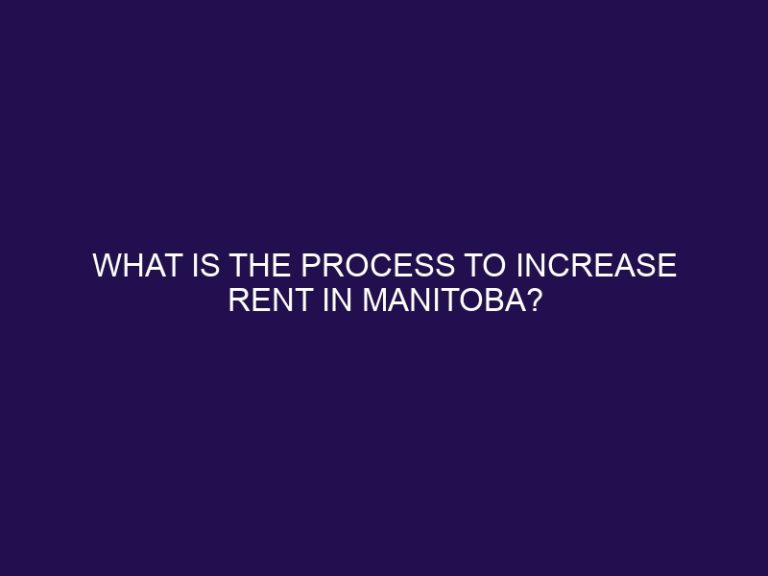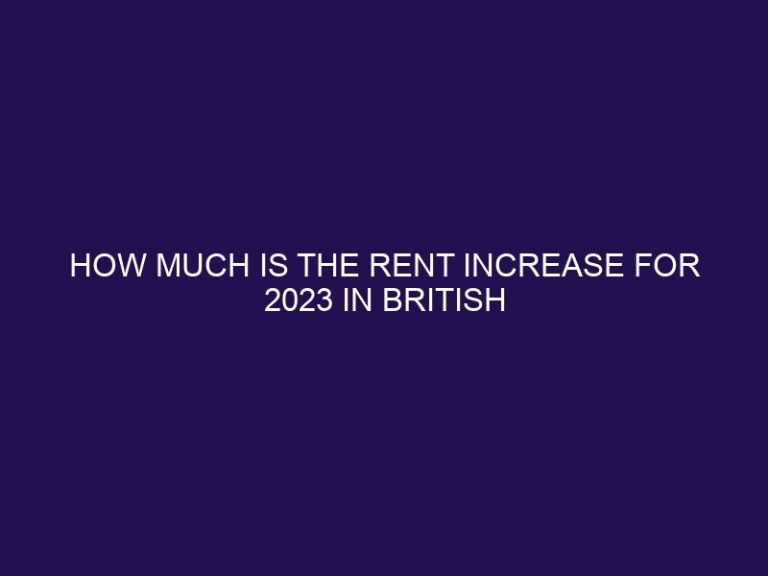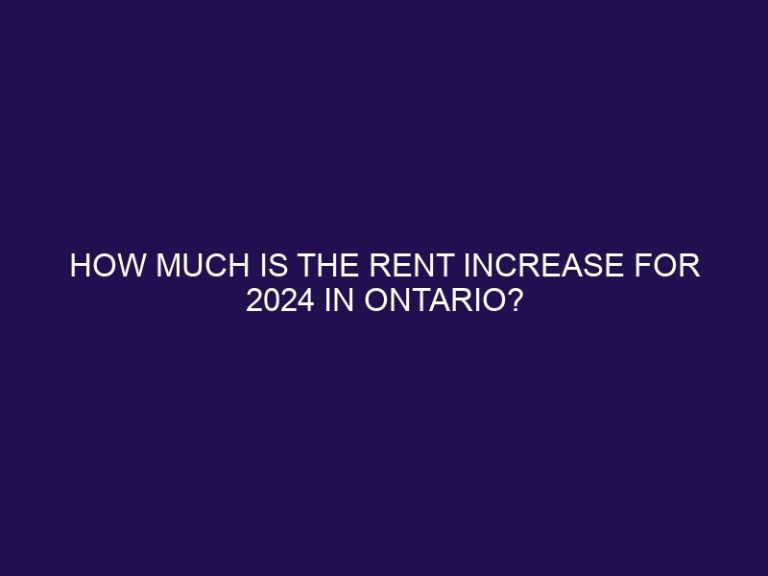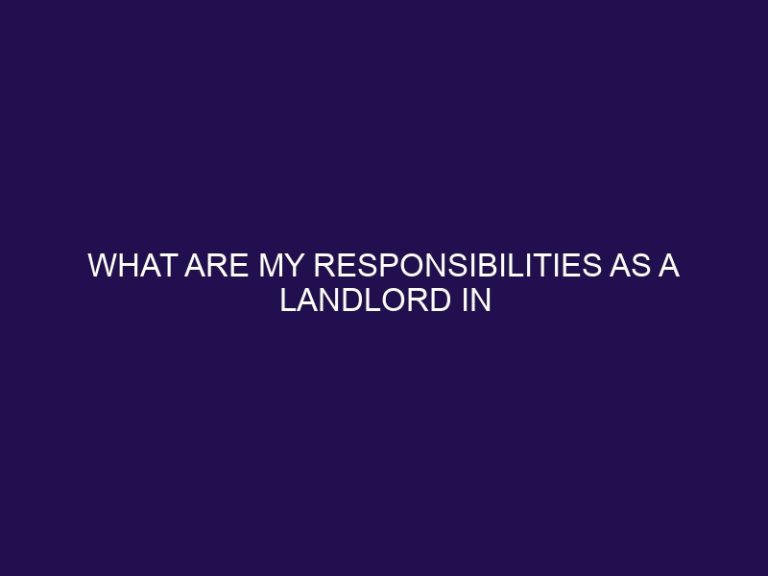How to calculate rent increase in PEI?
.jpg)
Understanding Rent Increase Guidelines in PEI is crucial for both tenants and landlords. The provincial government has established guidelines to regulate rent increases and ensure a fair balance between landlords’ rights and tenants’ affordability. Knowing how to calculate rent increases accurately is essential for landlords in PEI to stay within the legal requirements and maintain a good relationship with their tenants.
The Rent Increase Guidelines in PEI are based on specific factors and considerations. These guidelines outline the permissible maximum rent increase percentage and define exceptions in certain circumstances. Familiarizing yourself with these guidelines will help you navigate the process correctly and avoid any potential disputes or legal issues.
There are two main factors to consider when calculating rent increase in PEI. The first factor is the Consumer Price Index (CPI), which reflects the cost of living and inflation rate. The second factor is the availability and vacancy rate, which is an indicator of the rental market’s supply and demand dynamics. Understanding and incorporating these factors into your calculations will help you determine a reasonable and fair rent increase for your property.
To calculate rent increase in PEI, follow a step-by-step guide that includes determining the rent increase percentage, calculating the rent increase amount, and notifying the tenant. It is essential to follow these steps correctly and provide proper notice to the tenant to ensure compliance with the regulations and maintain a positive landlord-tenant relationship.
In the event of a disagreement or dispute over the rent increase, there are processes in place to address these issues. Tenants have the right to dispute a rent increase they believe to be unfair or unreasonable. Landlords should be aware of these processes and understand the steps involved in resolving disputes and appealing rent increase decisions.
Implementing rent increases can be a sensitive matter, and it is important for landlords to approach it with care and consideration. Following these guidelines and tips will help landlords navigate the process successfully and maintain a harmonious relationship with their tenants in PEI.
Key takeaways:
- Rent Increase Guidelines in PEI: Familiarize yourself with the rules and regulations governing rent increases in PEI, including the Rent Increase Guideline and its exceptions.
- Factors to consider in calculations: Take into account factors such as the Consumer Price Index, availability, and vacancy rate when determining the rent increase percentage.
- Step-by-step guide: Follow a clear process that involves determining the percentage increase, calculating the actual amount, and providing proper notification to the tenant.
Understanding Rent Increase Guidelines in PEI
Understanding Rent Increase Guidelines in PEI is essential for both landlords and tenants. The rules are set by the Residential Tenancies Act, which limits how much rent can be increased annually. In PEI, the rent can be increased by a maximum of 2% each year, based on the approved guideline increase. Landlords must provide written notice of any rent increase at least three months before it takes effect. It is important for tenants to be aware of their rights and responsibilities when it comes to rent increases in PEI. By understanding the guidelines, tenants can make informed decisions about their housing options.
How does the Rent Increase Guideline Work?
The Rent Increase Guideline in PEI is a framework that regulates the amount by which landlords can increase rent annually. It is based on the Consumer Price Index (CPI) and takes into account factors such as availability and vacancy rates. So, how does the Rent Increase Guideline work? Landlords must follow a step-by-step process to calculate the rent increase amount and notify the tenant. In disputes, tenants can disagree with the increase and appeal the decision. For landlords, implementing rent increases requires careful consideration and adherence to the guidelines.
A landlord in PEI named Sarah recently had to calculate a rent increase for her tenant. She followed the Rent Increase Guideline, considering the CPI and vacancy rate. Sarah notified her tenant professionally and provided a clear explanation of the increase. The tenant understood and appreciated Sarah’s adherence to the guidelines. This story demonstrates how the Rent Increase Guideline works to maintain fairness and transparency in the rental market in PEI.
What Are the Exceptions to the Rent Increase Guideline?
What Are the Exceptions to the Rent Increase Guideline?
Exceptions to the rent increase guideline in PEI exist in certain circumstances. These exceptions include renovations or repairs that significantly improve the rental unit, an agreement to increase rent above the guideline reached between the landlord and tenant, and cases where the landlord has incurred significant cost increases. These exceptions must meet specific criteria outlined by the Residential Rental Property Tribunal in order to be considered valid. Landlords must follow the proper procedures and provide documentation to demonstrate that the rent increase falls within one of these exceptions. It is crucial for both landlords and tenants to be aware of these exceptions to ensure compliance with the regulations.
Factors to Consider When Calculating Rent Increase
When calculating rent increase in PEI, several factors come into play. In this section, we’ll explore two key factors that greatly impact the process: the Consumer Price Index and the Availability and Vacancy Rate. We’ll uncover how these factors influence rent calculations and shed light on the important considerations landlords and tenants should keep in mind. So, let’s dive in and unravel the intricacies of rent increase calculations in PEI!
1. Consumer Price Index
The Consumer Price Index (CPI) is a vital measure to consider when determining rent increases in PEI. It reflects the average price change over time for a selection of goods and services paid by consumers. By utilizing the CPI, landlords can establish the maximum allowable rent increase annually. They can raise rents by a percentage equivalent to the yearly CPI, up to a limit of 2%. This ensures that rent hikes are fair and reasonable, taking into account the cost of living. To accurately calculate the rent increase, landlords can refer to the most recent CPI data provided by Statistics Canada. It is essential for landlords to stay informed about the CPI in order to make informed decisions about raising rents.
Suggestions:
- Keep up to date with the latest CPI data from Statistics Canada.
- Use the CPI as a guide to determine fair and reasonable rent increases.
- Take into account the impact of rent increases on tenants and make any necessary adjustments.
- Maintain open and transparent communication with tenants regarding rent increases, providing appropriate notice.
- Seek legal advice and consult the Residential Tenancies Act of PEI for further guidance.
2. Availability and Vacancy Rate
The availability and vacancy rate is a crucial factor to consider when determining rent increases in PEI. This vital information aids landlords in assessing the demand for rental properties in the area and making well-informed decisions regarding rent prices. The availability rate represents the percentage of currently vacant and available rental units. Conversely, the vacancy rate measures the percentage of rental units that are currently unoccupied. Both of these rates provide valuable insights into the supply and demand dynamics of the rental market, which can impact the appropriate rent increase amount.
Step-by-Step Guide to Calculating Rent Increase
Looking to calculate rent increase in PEI? Look no further! This step-by-step guide will walk you through the process, from determining the rent increase percentage to calculating the actual amount. We’ll also cover the important step of notifying your tenant. So, let’s dive in and learn how to navigate this process smoothly and legally. No more guesswork or confusion – just straightforward guidance to help you calculate rent increase like a pro!
Step 1: Determine the Rent Increase Percentage
To determine the rent increase percentage in PEI, follow these steps:
-
Determine the Rent Increase Percentage:
-
Review the Rent Increase Guidelines provided by the government.
-
Calculate the allowed maximum rent increase percentage based on the guidelines.
-
Consider factors such as the Consumer Price Index and availability/vacancy rate.
-
Adjust the percentage if there are exceptions to the Rent Increase Guidelines.
-
Record the final rent increase percentage determined by the calculations.
Step 2: Calculate the Rent Increase Amount
To determine the rent increase amount in PEI, landlords can follow these steps:
-
Step 1: Determine the rent increase percentage, based on the Rent Increase Guideline.
-
Step 2: Calculate the Rent Increase Amount by multiplying the current rent by the percentage increase.
-
Step 3: Notify the tenant of the rent increase in writing, including the new rent amount and effective date.
By carefully following these steps, landlords can accurately calculate the Rent Increase Amount, as per PEI regulations. It is crucial to communicate the rent increase clearly and provide proper notice to tenants.
Step 3: Notify the Tenant
- Prepare written notice: Create a written notification clearly stating the rent increase amount and effective date.
- Serve the notice: Deliver the notice to the tenant personally or through registered mail.
- Notify the Tenant: Retain proof of delivery: Keep a copy of the notification and any evidence of delivery, such as an acknowledgment of receipt.
- Allow sufficient notice period: Ensure that the tenant receives the notification at least three months before the effective date.
- Keep communication open: Address any questions or concerns the tenant may have regarding the rent increase.
Remember to approach the tenant with respect and provide clear information throughout the process. Maintaining good communication can help foster positive landlord-tenant relationships.
Dealing with Disputes and Appeals
Dealing with disputes and appeals when it comes to rent increases in PEI can be a challenging and exasperating process. Here are some steps to assist you in navigating this situation:
- Comprehend the reasons for the rent increase and determine whether it falls within the allowable limits set by the Residential Rental Property Regulations.
- Thoroughly review your tenancy agreement to ensure that your landlord provided the appropriate notice.
- If you believe the rent increase is unjust or unfair, gather evidence to substantiate your case, such as documentation of maintenance issues or breaches of the tenancy agreement.
- Contact the Office of the Rentalsman to file a dispute or appeal, providing all relevant documents and information.
- Participate in any scheduled mediation or arbitration hearings to resolve the dispute.
- If the dispute remains unresolved through mediation or arbitration, it may be prudent to seek legal advice or representation to proceed with a court case.
If you find yourself facing disputes and appeals regarding a rent increase in PEI, it is crucial to stay well-informed about your rights as a tenant and to document any problems or concerns that may arise. Consider seeking assistance from tenant advocacy organizations or legal professionals who specialize in landlord-tenant disputes. Remember, maintaining a calm demeanor and being prepared will enable you to navigate this process more effectively.
What to Do if the Tenant Disagrees with the Rent Increase?
If a tenant disagrees with a rent increase, there are several steps they can take to address the issue:
-
Review the Lease Agreement: Carefully read the lease agreement to understand the terms and conditions regarding rent increases.
-
Communicate with the Landlord: Reach out to the landlord to express your concerns and discuss the reasons for your disagreement.
-
Seek Legal Advice: If you don’t know what to do if the tenant disagrees with the rent increase, it is recommended to consult with a lawyer or tenant rights organization to understand your rights and explore possible legal actions.
-
Negotiate with the Landlord: Try to negotiate with the landlord and find a mutually agreeable solution, such as a lower rent increase or a longer notice period.
-
File a Complaint: If you are uncertain about what steps to take when the tenant disagrees with the rent increase, you can file a complaint with the relevant housing authority or tribunal if the landlord refuses to cooperate or if you believe the rent increase is unjust.
-
Attend a Hearing: If your complaint goes to a hearing, be prepared to present your case and provide supporting evidence to support your position.
-
Review the Decision: After the hearing, carefully review the decision and consider your options, such as accepting the decision or pursuing further legal action if necessary.
What Is the Process for Appealing a Rent Increase Decision?
- Rent Increase Decision Appeal Process: Understanding the steps involved
- Step 1: Familiarize yourself with the Rent Increase Guidelines for your area to verify if the increase falls within the permissible range.
- Step 2: Gather supporting evidence for your case, such as documentation of any required repairs or maintenance concerns.
- Step 3: Get in touch with the relevant authority, such as a rent review board or housing tribunal, and submit a written appeal.
- Step 4: Attend any scheduled hearings or meetings to present your case and provide additional supporting evidence, if necessary.
- Step 5: Patience is key as you await the decision of the authority, as it may take time based on their process and workload.
Pro-tip: It is advisable to seek legal advice or assistance from a tenant advocacy organization throughout the appeal process to safeguard your rights.
Tips for Landlords on Implementing Rent Increases
Implementing rent increases as a landlord requires careful planning and consideration. Here are some tips for landlords on implementing rent increases to help you navigate this process successfully:
- Stay Informed: Familiarize yourself with local rent control laws and regulations to ensure compliance.
- Give Notice: Provide tenants with written notice in advance of the rent increase, typically 30 to 90 days, depending on your local laws.
- Justify the Increase: Clearly communicate the reasons for the rent increase, such as rising expenses or improvements to the property.
- Fair and Reasonable: Ensure that the proposed rent increase is fair and aligns with market rates in your area.
- Consider Lease Renewal: Timing rent increases with lease renewals can make the process smoother and more transparent for both parties.
- Communicate Effectively: Maintain open lines of communication with your tenants, addressing any concerns or questions they may have about the rent increase.
Some Facts About How To Calculate Rent Increase in PEI:
- ✅ Rent hikes on Prince Edward Island (P.E.I.) will be capped at 3% in 2024, unless landlords get higher increases approved. (Source: CBC News)
- ✅ Landlords can raise rents by 3% without having to apply to the Island Regulatory and Appeals Board (IRAC) for permission. (Source: CBC News)
- ✅ The maximum allowable rent increase in 2024 will be six per cent, according to the province’s director of residential tenancy. (Source: CBC News)
- ✅ Landlords must give tenants at least three months notice for a rent increase, as per P.E.I.’s rules. (Source: CBC News)
- ✅ Landlords can apply to IRAC for an additional three per cent increase, making it a total of six per cent over the 2023 rent, but they must provide arguments for why they need it. (Source: CBC News)
Frequently Asked Questions
How to calculate rent increase in PEI?
To calculate the rent increase in PEI, you will need to consider the guidelines provided by the Residential Tenancy Act and the Island Regulatory and Appeals Commission. Here’s how you can calculate it:
What factors are considered when determining the allowable rent increase in PEI?
The allowable rent increase in PEI is determined based on several factors which include written representations from landlords and tenants, the percentage change in the All-Items Consumer Price Index for Prince Edward Island, and other specified factors. These factors help in determining the maximum percentage increase that landlords can apply.
Can landlords raise rents without seeking approval in PEI?
Yes, landlords in PEI can raise rents by up to 3% without having to apply for approval from the Island Regulatory and Appeals Board (IRAC). This increase can be done once every 12 months for each tenant, provided they give at least three months notice.
How can landlords apply for a rent increase exceeding the approved percentage?
If landlords in PEI wish to apply for a rent increase exceeding the approved percentage (up to a maximum of 6%), they can submit an application to the Island Regulatory and Appeals Commission (IRAC). This application must include arguments and justifications for why the increase is necessary.
What is the maximum allowable rent increase for the year 2024 in PEI?
In PEI, the maximum allowable rent increase for the year 2024 is capped at 6%, according to the province’s director of residential tenancy. This increase takes into account the year-over-year percentage change in the Consumer Price Index for P.E.I., which was calculated at 6.1%.
Are there any exceptions to the rent increase guidelines in PEI?
Yes, there are exceptions to the rent increase guidelines in PEI. In 2023, separate legislation passed by the provincial government capped rent increases at zero per cent due to the impact of inflation on low or fixed-income Islanders. This exception was put in place to protect vulnerable tenants from excessive rent hikes.







